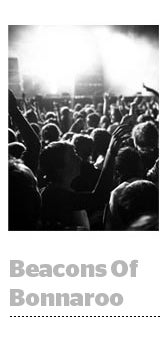 Beacons might not work for every business. But for a company like Live Nation Entertainment, owner of ecom platform Ticketmaster and a bunch of major music festivals (Lollapalooza, Bonnaroo, C3, Electric Daisy), beacons offer significant value-add for sponsors.
Beacons might not work for every business. But for a company like Live Nation Entertainment, owner of ecom platform Ticketmaster and a bunch of major music festivals (Lollapalooza, Bonnaroo, C3, Electric Daisy), beacons offer significant value-add for sponsors.
Following a two-year pilot, Live Nation this year will roll out a location-powered platform, designed to help sponsors continue their relationships with customers before a festival begins and after it ends. There’s no set release date for the features, which will be available to brand sponsors of Live Nation’s festivals.
In the past, brands would simply plaster billboards or buy tables at an event – but those consumer interactions are fleeting. The actual music festival might last for only a handful of days, but there’s usually a monthslong lead-up, beginning with consumer research or a ticket sale, said Mike Finnegan, who is tasked with applying Live Nation’s data across its physical and digital properties.
Speaking with AdExchanger at this week’s RampUp conference in San Francisco, Finnegan described the range of data Live Nation collects both pre- and post-event.
At worst, Live Nation can cookie a user’s browser. At best, it has a ticket sale associated with an email address. Once the festival starts, Live Nation knows where music fans go and which sponsored tables they visited. And if a brand knows which music acts its customers enjoy, they can be more targeted with future sponsorships or advertising opportunities.
But it’s not exactly a data package.
“We don’t give data,” Finnegan said. After the festival is over, Live Nation will target and serve ads on behalf of the advertiser, but it’s up to that client to continue the relationship.
Live Nation began experimenting about two years ago at a festival in Atlanta, when it slapped a beacon under a sponsor’s table.
The goal was just to see what would happen.
“You’re learning,” Finnegan said. “We needed to figure out what the scale was going to be. You’ll never get 100% of the people.”
While the beacon is designed to ping the official festival app, not everybody might be using that app. And even if people use the app, they still need to activate Bluetooth.
Those habits are highly variable. As Finnegan learned, some audiences had a lower adoption rate for festival applications and for switching on location. By contrast, nearly 90% of EDM fans downloaded the app.
“That was one of the bigger things we had to beta test,” Finnegan said. “We had to learn what the funnel was so when we go to marketers, we don’t sell them a package that isn’t scalable.”
The entertainment company also had to test its ability to transfer data from the physical world to the digital marketing platform. What sort of attrition would occur? What’s the accuracy of the location and can the accuracy be validated?
Live Nation had eight to 10 vendor partners to help accomplish this, including LiveRamp – which took identifiers from phones and turned them into connected mobile IDs and cookies.
“My role was the data flow,” Finnegan said.
As Live Nation selected vendor partners to help build out the festival program, Finnegan would identify which ones were a good fit for the data opportunity. That included identifying what the content management system looked like, the ability of vendor partners to export data, the format of the data they couldn’t export and whether Live Nation’s other partners could ingest data in a usable format.
“We’re taking five to six tables of data from RFID, cashless ticket purchasing, email subscribers,” Finnegan said. “We merge all of that into one actionable table of data, where we have a lot of depth in terms of what people did at our events to what people are interested in.”












